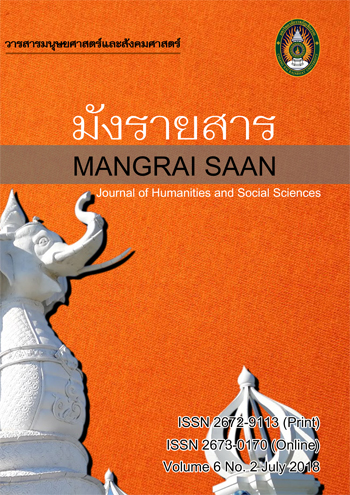ทัศนคติต่อการพัฒนาทักษะการใช้ความคิดเชิงวิจารณญาณในการเรียนวรรณคดีของผู้เรียนภาษาอังกฤษ เป็นภาษาต่างประเทศในระดับมหาวิทยาลัย
Main Article Content
บทคัดย่อ
งานวิจัยนี้มีวัตถุประสงค์เพื่อศึกษาทัศนคติต่อการพัฒนาทักษะการใช้ความคิดเชิงวิจารณญาณในการเรียนวรรณคดี ของผู้เรียนภาษาอังกฤษเป็นภาษาต่างประเทศ ในระดับมหาวิทยาลัย เครื่องมือที่ใช้ในการเก็บข้อมูลคือ แบบสอบถามทัศนคติต่อการพัฒนาทักษะการใช้ความคิดเชิงวิจารณญาณในการเรียนวรรณคดี ประกอบไปด้วย 5 ด้าน ได้แก่ ด้านความรู้และความเข้าใจต่อการใช้ความคิดเชิงวิจารณญาณ ด้านเนื้อหาวิชาวรรณคดี ด้านวิธีการสอน ด้านการประเมินผล และด้านปัจจัยส่วนบุคคล กลุ่มประชากรคือ นิสิตสาขาวิชาภาษาอังกฤษ คณะศิลปศาสตร์ มหาวิทยาลัยพะเยา ชั้นปีที่ 4 จำนวน 105 คน เครื่องมือที่ใช้ในการเก็บข้อมูลได้แก่ แบบสำรวจทัศนคติ ผลการวิจัยพบว่าผู้เรียนส่วนใหญ่ตระหนักถึงความสำคัญของการเรียนวรรณคดี ในการช่วยพัฒนาทักษะการใช้ความคิดเชิงวิจารณญาณ โดยผู้เรียนเข้าใจและทราบถึงความหมายของความคิดเชิงวิจารณญาณ นอกจากนี้ยังเห็นด้วยว่าเนื้อหาวิชาวรรณคดีมีผลต่อการพัฒนาทักษะการใช้ความคิด เชิงวิจารณญาณ โดยวิธีการสอนโดยให้แสดงบทบาทสมมุติช่วยให้ผู้เรียนพัฒนาทักษะการคิดเชิงวิจารณญาณมากที่สุด สำหรับการประเมินผลที่สามารถพัฒนาการคิดเชิงวิจารณญาณมากที่สุด คือ การเขียนเชิงสร้างสรรค์ ส่วนปัจจัยส่วนบุคคลที่มีผลต่อการพัฒนาทักษะการใช้ความคิดเชิงวิจารณญาณ คือ ทักษะภาษาอังกฤษด้านการพูด
Article Details
เนื้อหาและข้อมูลในบทความที่ลงตีพิมพ์ในวารสารมังรายสาร ถือเป็นข้อคิดเห็นและความรับผิดชอบของผู้เขียนบทความโดยตรงซึ่งกองบรรณาธิการวารสาร ไม่จำเป็นต้องเห็นด้วย หรือร่วมรับผิดชอบใดๆ
บทความ ข้อมูล เนื้อหา รูปภาพ ฯลฯ ที่ได้รับการตีพิมพ์ในวารสารมังรายสาร ถือเป็นลิขสิทธิ์ของวารสารมังรายสาร หากบุคคลหรือหน่วยงานใดต้องการนำทั้งหมดหรือส่วนหนึ่งส่วนใดไปเผยแพร่ต่อเพื่อกระทำการใดๆ จะต้องได้รับอนุญาตเป็นลายลักอักษรณ์จากวารสารมังรายสารก่อนเท่านั้น
เอกสารอ้างอิง
จิราวรรณ เกิดผล. (2554). การพัฒนากระบวนการคิดของผู้เรียนด้วยกิจกรรมคิดยามเช้า (Morning Thinking Activity). สืบค้นเมื่อ 9 พฤศจิกายน 2559, จาก http://swis.acp.ac.th/pdf/research/jirawan_54.pdf
ณรงค์ วรรณจักร. (2550). การจัดการเรียนรู้แบบสืบสวนสอบสวน (Inquiry). สืบค้นเมื่อ 11 พฤศจิกายน 2559, จาก http://kmsc1.multiply.com/journal/item/67.
ทิศนา แขมมณี. (2555). บัณฑิตศึกษาในศตวรรษที่ 21: การปรับหลักสูตรและการสอน. เอกสารประกอบการประชุมวิชาการของราชบัณฑิตยสถานร่วมกับมหาวิทยาลัยวไลยอลงกรณ์.
ธีรนุช อนุฤทธิ์. (2559). การใช้กลุ่มวรรณกรรมเพื่อเพิ่มพูนทักษะการคิดวิเคราะห์ของผู้เรียนภาษาอังกฤษชาวไทย. วารสารภาษาปริทัศน์. 31: 81-106.
เบญจวรรณ ถนอมชยธวัช และคณะ. (2559). ทักษะแห่งศตวรรษที่ 21: ความท้าทายในการพัฒนานักศึกษา 21st Century Skills: A Challenge for Student Development. วารสารเครือข่ายวิทยาลัยพยาบาลและการสาธารณสุขภาคใต้: 208-222.
รวีวรรณ ชินะตระกูล. (2542). การทําวิจัยทางการศึกษา. กรุงเทพฯ : ที.พี. พรินท.
วิจารณ์ พานิช. (2555). วิถีสร้างการเรียนรู้เพื่อศิษย์ ในศตวรรษที่ 21. พิมพ์ครั้งที่ 3. กรุงเทพฯ: มูลนิธิสดศรีสฤษวงศ์.
สำนักงานคณะกรรมการการศึกษาขั้นพื้นฐาน กระทรวงศึกษาธิการ. (2559). การจัดการศึกษาขั้นพื้นฐานเพื่อการมีงานทำตามแนวทางการจัดทักษะการเรียนรู้ในศตวรรษที่ 21การพัฒนานักศึกษาในศตวรรษที่ 21. สืบค้นเมื่อ 16 พฤศจิกายน 2559, จากhttp://www.kksec.go.th/download/meework001.pdf
สำนักงานคณะกรรมการอุดมศึกษา กระทรวงศึกษาธิการ. (2551). บทความบริหารกรอบแผนอุดมศึกษาระยะยาว 15 ปี ฉบับที่ 2 (พ.ศ.2551-2555). กรุงเทพ: สำนักพิมพ์จุฬาลงกรณ์มหาวิทยาลัย.
สุรีรัตน์ ไชยสุริยา. (2543). ความสัมพันธ์ระหว่างความสามารถในการคิดอย่างมีวิจารณญาณและความสามารถในการอ่านอย่างมีวิจารณญาณภาษาอังกฤษของนักเรียนชั้นมัธยมศึกษาปีที่6 ในโรงเรียนสังกัดคณะกรรมการการศึกษาเอกชน กรุงเทพมหานคร. วิทยานิพนธ์ ค.ม. (มัธยมศึกษา). กรุงเทพฯ: บัณฑิตวิทยาลัย จุฬาลงกรณ์มหาวิทยาลัย.
สุรพงษ์ ยิ้มละมัย. (2539). การสอนการอ่านเพื่อเพิ่มความสามารถในการคิดเชิงวิจารณ์ตามการวิจารณ์แนวสุนทรียศาสตร์. วิทยานิพนธ์ ศษ.ม. (การสอนภาษาไทย). เชียงใหม่: บัณฑิตวิทยาลัย มหาวิทยาลัยเชียงใหม่.
Anderson, L. W. & Krathwohl, D. R. (2001). A taxonomy for learning, teaching and assessing: A revision of Bloom's taxonomy of educational objectives. New York: Longman.
Bellanca, J. & Brandt, R. (Eds). (2010). 21st Century Skills: Rethinking how students learn. Bloomington: Solution Tree Press.
Bloom, B. S.; Engelhart, M. D.; Furst, E. J.; Hill, W. H.; & Krathwohl, D. R. (1956). Taxonomy of Educational Goals: Handbook 1: Cognitive Domain. New York: David McKay.
Carrison, C. & Slavit, G. (2005). From silence to a whisper to active participation: Using literature circles with EFL students. Reading Horizon. 46(2): 93-113.
Chi-An Tung & Shu-Ying Chang. (2009, December). Developing Critical Thinking through Literature. Feng Chia Journal of Humanities and Social Sciences. No. 19: 287-317.
Fisher, R. (2003). Teaching Thinking. (2nd.). London: Continuum.
Giuria, L. (2015). Teaching literature in the ESL classroom: A qualitative study on teachers’ views of literature in an upper secondary school environment in southern Sweden. Retrieved November 19, 2016 from http://lup.lub.lu.se/luur/download?func=downloadFile&recordOId=8596984&fileOId=8596985.
Hwang, D. & Embi, M. A. (2007). Approaches Employed by Secondary School Teachers Teaching the Literature Component in English. Jurnal Pendidik dan Pendidikan. 22: 1-23.
Jaffar, S. (2004). Teaching critical thinking through literature. Journal of Research (Faculty of Languages & Islamic Studies). 5: 15-26.
Hismanoglu, M. (2005). Teaching English through literature. Journal of Language and Linguistic Studies. 1(1): 53-66.
Kaowiwattanakul, S. (2012). The Place and Role of Literature Courses in Undergraduate EFLCurriculum in Thai Universities: A Survey of University Lecturers’ Attitudes. Journal of Humanities, Naresuan University. 9(3): 33-50.
Min-hsun Liao. (2012). Cultivating Critical Thinking through Literature Circles in EFL Context. Spectrum: Studies in Language, Literature, Translation, and Interpretation. 5: 89-116.
Rahimi, S. (2014). The use of literature in EFL classes. Journal of Academic and Applied Studies. 4(6): 1-12.
Sell, J. A. (2005). “Why teach literature in the English language classroom?”. Encuentro Journal of Research and Innovation in the Language Classroom. 86-93.
Taylor, R. (2009). The Paradox of University EFL: A Liberal Arts Subject without Liberal Arts Content. English Studies. 4: 1-29
The Partnership for 21st Century Learning. (2015). Framework for 21st Century Learning. Retrieved November 22, 2016 from http://www.p21.org/storage/documents/docs/P21_Framework_Definitions_New_Logo_2015.pdf.
Tompkins, G. E. & McGee, L. M. (1993). Teaching Reading With Literature: Case studies to action plans. New York: Merrill.
Yimwilai, S. (2015). An integrated approach to teaching literature in an EFL classroom. English Language Teaching. 8(2): 14-21.


